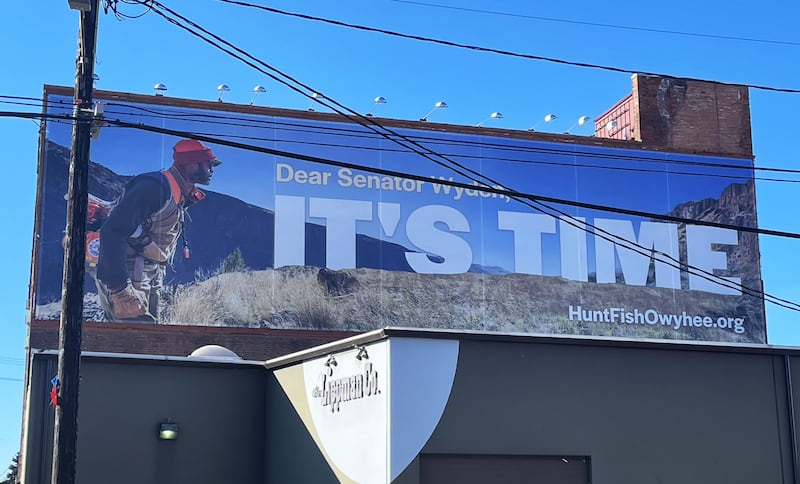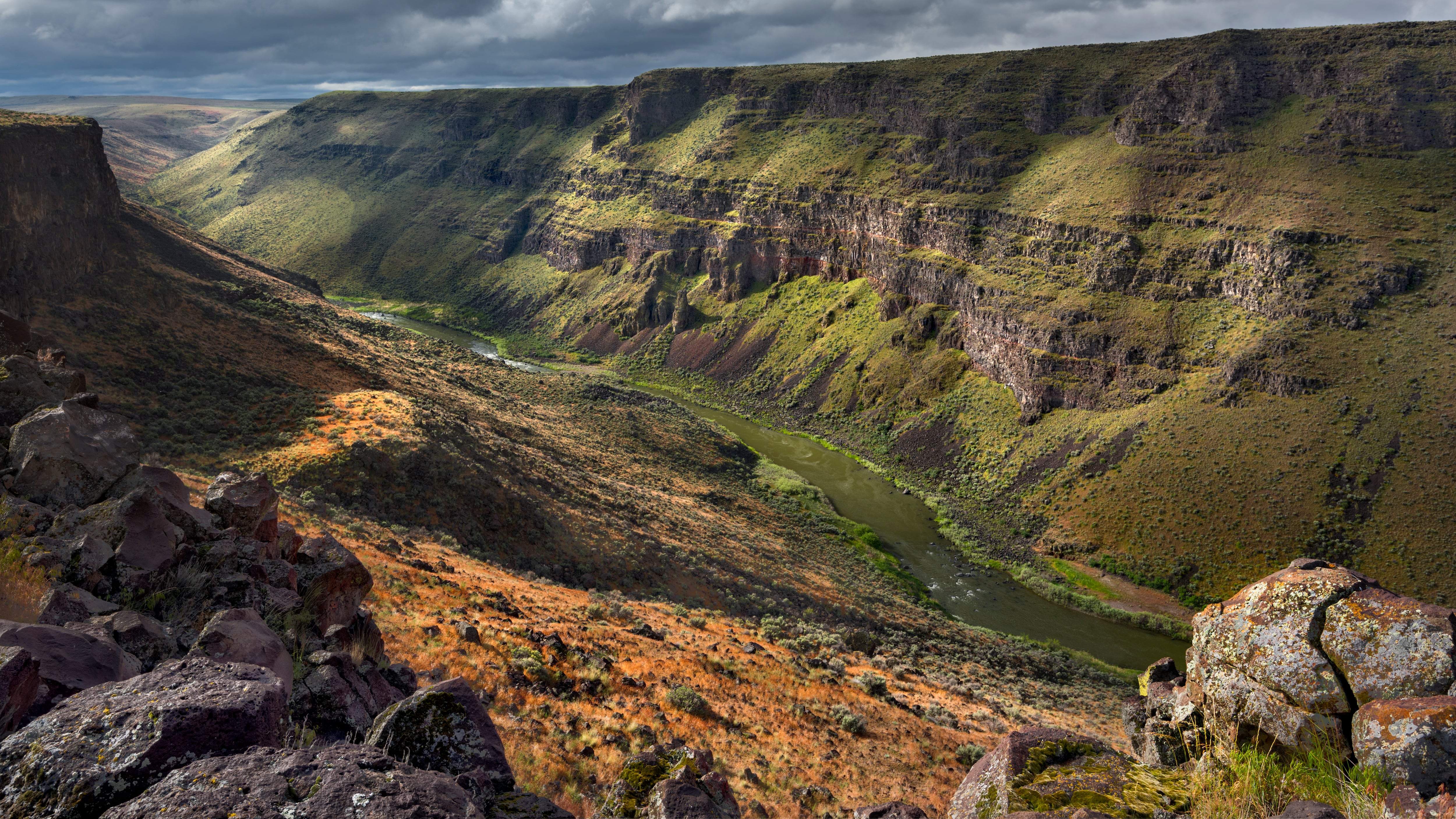Prominently placed billboards and a flurry of direct-mail pieces are alerting Portlanders to a hot-button Oregon political issue—almost 500 miles away in Malheur County.
The aim of the campaign, however, is to put pressure on sometime-Portland resident, U.S. Sen. Ron Wyden (D-Ore.).

“The largest conservation opportunity left in the American West is right here in Oregon,” reads the mailer, with an arrow pointing toward the state’s southeastern corner. “Ask Senators Ron Wyden and Jeff Merkley to work with President Biden to create an Owyhee Canyonlands national monument before the end of 2024!”
The Bend-based nonprofit Oregon Natural Desert Association and numerous other groups, led locally by Oregon League of Conservation Voters, believe Wyden, as Oregon’s senior senator, holds the key to securing federal protections for 1.1 million acres of the Owyhee Canyonlands in southeastern Oregon.
It might seem odd that the conservation groups are targeting Wyden. For nearly a decade, no other member of Congress has worked harder (meeting with ranchers, business groups and conservation advocates) to find a compromise that could preserve one of the most spectacular places in the American West.
But Wyden and conservation groups differ on the means of achieving that end, and enviros worry that Wyden’s strategy risks losing everything.
After years of spade work that resulted in significant local support, Wyden introduced legislation in 2019 that would provide federal wilderness protection to 1.1 million acres (down from an initial concept of 2.5 million acres). Although Wyden has repeatedly reintroduced similar legislation, it has never passed out of the Senate.
ONDA and its allies want Wyden to stop busting his pick on a bill that’s going nowhere and instead leverage President Joe Biden’s desire for a legacy by asking him to use the power of his office to protect the Owyhee.
Wyden doesn’t want to do that. He says his bill is better. He wants Congress to designate the Owyhee a wilderness. That hasn’t happened. And Biden’s tenure ends soon, so critics say Wyden’s legislative strategy risks winding up with nothing.
“The choice isn’t between legislation and a national monument,” says Lindsey Scholten, the executive director of the Oregon League of Conservation Voters.
“It’s between protecting Oregon’s Grand Canyon or not.”
Steve Pedery, the conservation director of Oregon Wild, which has spent decades fighting for greater protections for Mt. Hood, says getting presidents involved can be crucial: The only way Crater Lake and Olympic national parks gained protection was the willingness of Presidents Theodore and Franklin Roosevelt, respectively, to face down timber companies.
“The history of public lands in this country is hostility from people who benefited from exploiting those lands,” Pedery says. “To actually make something happen often takes the realization that a place belongs to all Americans, not just local interests who might oppose protection.”
ONDA executive director Ryan Houston says that Oregonians who haven’t visited the Owyhee Canyonlands are missing out on “deep rugged canyons, wild rivers, expansive sagebrush plains, and some of the darkest night skies in the country.”
“The region is rich with a deep cultural history, abundant wildlife and biodiversity, and a sense of remoteness and wildness that is unlike many places in Oregon,” Houston adds. “It is stunningly beautiful and iconic as one of America’s last and largest remaining unprotected landscapes.”
The area is sparsely populated. Here’s how ONDA’s website describes hotel choices in the area: “There are no lodging options within the Owyhee Canyonlands.” (There is one hotel in Jordan Valley, the closest town.)
But like many of America’s natural treasures, it also possesses commercial value. The Owyhee, according to a 2016 state geological report, in addition to serving as sprawling cattle rangelands, is rich in valuable minerals, including uranium, lithium, gold and silver.
Wyden has served in the Senate since 1996—longer than all but three senators. And as the chair of the Senate Finance Committee, he is one of the body’s most powerful members.
Yet for all his seniority and pull, Wyden hasn’t been able to move the bill he calls the Malheur Community Empowerment for the Owyhee Act.
Wyden spokesman Hank Stern says the senator is proud of the compromise bill crafted by “his constituents who came together to protect wilderness, provide ranchers more flexibility on rangelands and return ancestral lands to the Burns Paiute Tribe.” And Wyden is proud that his bill moved out of committee earlier this year and awaits a vote of the full Senate.
That bill would enact federal wilderness designation for the Owyhee. Congress has created more than 800 wilderness areas. Doing so requires passage in both chambers. (Congress voted to make 267,000 of the Owyhee River drainage in Idaho a wilderness in 2009.)
But if a wilderness designation stalls, a president can declare an area a national monument with the stroke of a pen.
The distinction between the two types of protection, according to the U.S. Department of the Interior, is that wilderness designations convey a more standard set of rules, while national monuments have more flexible terms—and are therefore more frightening to opponents.
Conservation groups have targeted U.S. Rep. Cliff Bentz (R-Ore), whose 2nd Congressional District includes the Owhyee. They say Bentz, an advocate for mining and cattle ranching, is standing in the way of creating a wilderness area.
Bentz says that’s false. He says he’s confident if Wyden’s bill passes the Senate, Bentz can rally the votes to get a slightly smaller wilderness area (930,000 acres vs. 1.1 million) through the House by year end. “We have plenty of time to get it done,” Bentz says.
What Bentz opposes—and he is adamant—is a national monument designation. He says that would provide less protection. “If you call it a monument, you will have thousands of people tromping around out there,” Bentz says.
The other big change he would make to Wyden’s bill in the House: prohibiting ever making the area a national monument.
The threat of monuments has a way of forcing action. Congress created the Owyhee Wilderness in Idaho only after President Bill Clinton considered declaring it a monument before he left office in 2001.
Biden has already created or expanded seven national monuments, and his staff has let conservationists know he is seeking to do more. ONDA’s Houston says Biden’s administration is favorably inclined toward the Owyhee. It is the biggest parcel of land up for conservation, which would allow the president to make a big splash. But without the support of Oregon’s senior senator (and Merkley, who has followed Wyden’s lead on the issue), the administration has told supporters there will be no monument.
Wyden acknowledges that risk, and still he insists his plan for a wilderness would play better in southeastern Oregon.
“Sen. Wyden believes the legislation he developed with local input will do more for Malheur County and the Owyhee region than a monument designation,” Stern says.
But 70,000 Oregonians have signed a petition supporting the establishment of a national monument. Also in support: Gov. Tina Kotek, who wrote to Biden last month urging him to act.
“In the event that Congress does not pass legislation this year, I ask that President Biden designate the Owyhee Canyonlands as a national monument,” Kotek wrote on Aug. 5.
Betting on Congress to act, Houston says, is a huge risk. So is the possibility that former President Donald Trump, who has made support for oil, gas and mining industries a pillar of his policies, might win November’s election, closing the window.
It could be Biden’s decision to make. ONDA and its allies have spent money on billboards in Bend, Salem and Portland and glossy mailers (not to mention full-page ads in The Oregonian and The Washington Post) to pressure Wyden to help Biden make that decision.

Wyden hears them. “As a fierce defender of the First Amendment, he appreciates Oregonians expressing their opinions,” Stern says. “And he knows full well that while these advocates and he may differ on the means, they agree on the end goal of protecting the Owyhee.”
Scholten worries that Wyden is letting the perfect be the enemy of the good.
“We are asking Sen. Wyden to protect it now with a national monument and pass legislation in 2025 to follow through,” she says. “We know Sen. Wyden loves basketball, so said another way, when you have the shot lined up, you better take it.”

